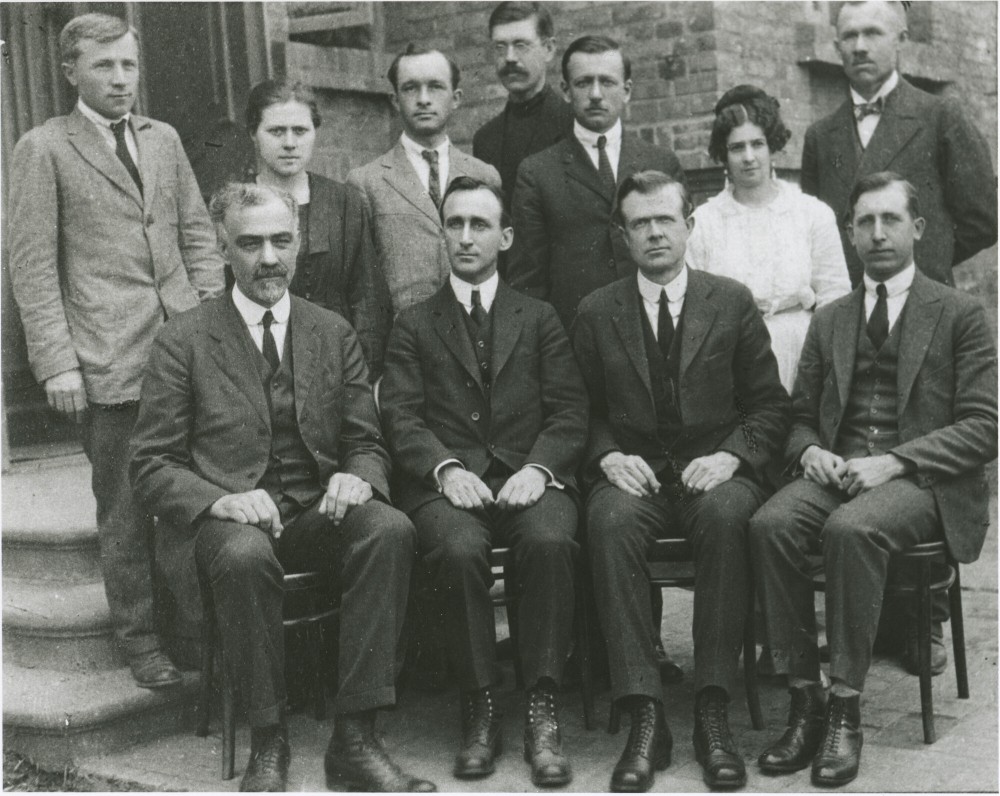Mennonite Central Committee celebrates 100 years of service

Mennonite Central Committee’s centennial didn’t start the way anyone had planned.
Like many nonprofits, the global development organization was hit hard by COVID-19. In May, MCC announced that, due to the travel restrictions and an uncertain financial future related to the pandemic, it would be ending all programming in Vietnam, China, and southern Africa. Additionally, programming in the Middle East, Europe, and Central America would be downsized.
Thirteen staff positions ended with the fiscal year.
One hundred years ago, the organization’s initial efforts to help people in dire need of food in southern Russia didn’t go as planned either.
Clayton Kratz, Orie O. Miller, and Arthur Slagel, the first representatives of MCC, traveled from the US in the fall of 1920 to deliver food and clothing to people in present-day Ukraine. The three men were responding to Russian Mennonites’ pleas for help, which led to the creation of a “central committee” to coordinate responses from Mennonites and Mennonite Brethren.
Read our latest issue or browse back issues.
After they established a base in Constantinople (now Istanbul), Miller and Kratz traveled to Russia, where they witnessed devastation and listened to the stories of repeated pillaging by armed groups that had left many Mennonite families destitute and terrified.
Once Miller returned to Constantinople, he sent Slagel and a $30,000 shipment of food and clothing on a Greek ship to Crimea, a peninsula that was the gateway to southern Russia. But a few weeks after the ship sailed, Miller learned that Russia’s Red Army was in control of southern Russia and Crimea, and no relief supplies could enter safely.
Miller didn’t know where Kratz, Slagel, or the shipment were. He had made promises and commitments to people in Russia, but now it seemed there was no way to reach them.
He was relieved when Slagel returned with the supplies.
By persistently working with numerous government officials, MCC was able to get food into southern Russia by Christmas 1921 and continued shipments in 1922.
At the peak of its response in March 1922, MCC was providing 25,000 daily food rations to Mennonites and others. MCC sent tractors and seeds to help farmers get crops in the ground, and the aid continued until the first harvest of 1923. Contributors gave $2.45 million to support the Russian response.
“It came almost miraculously from faraway America, from friends they had never seen or known, from someone who wished them well,” A. J. Miller is quoted as saying in the book Feeding the Hungry, by P. C. Hiebert and Orie O. Miller.
“It was love reaching out its strong hands across the waters and the plains; across oceans and continents.”
That outpouring of support has continued for the last century, and on October 17, MCC hosted a livestream celebration of its past and present.
“MCC at its best, has a prophetic imagination,” said longtime MCC leader Leonard Dow in a press release. “We are patiently persistent, and we have a willingness to get into ‘necessary trouble’ as we respond to basic human needs and work for peace and justice.”
During the pandemic, MCC’s health programs have been strengthened through teaching COVID-19 prevention techniques, distributing hygiene and sanitation supplies, and making clean water available. Training for peacebuilding, health care, and farming techniques has gone virtual where possible; other training takes place one on one or in outdoor settings where people can spread apart.
MCC’s constituents have also adapted to the pandemic by turning relief sales—long a staple of MCC’s fundraising efforts—into virtual auctions.
“Throughout MCC’s 100 years, MCC’s staff and partners have had to be creative and resourceful in spite of challenges they encountered,” said J Ron Byler, MCC US executive director.
“This year has been no different, as we . . . and our partners meet people’s needs in the midst of the coronavirus. But God has been faithful over all these years, helping us and guiding us as we share God’s love and compassion in the name of Christ in the midst of crisis. And for that we are very thankful.” —Mennonite Central Committee, Dawn Araujo-Hawkins. Most of the historical information used in this article came from John E. Sharp’s My Calling to Fulfill: The Orie O. Miller Story.





